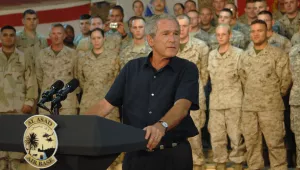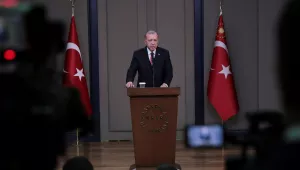Background — A decline in defence spending
The first duty of Government — any government — is the defence of the realm. This has not been reflected in defence funding for twenty years, and particularly in the last twelve years. While our brave troops have faced danger every day, Government ministers have been running down the Armed Forces budget without having the courage to face the political consequences of making such a decline an explicit policy.
This paper summarises the United Kingdom National Defence Association's (UKNDA's) position on this state of affairs, and what the next Prime Minister must do to fix it.
Put simply, unless the next occupant of No. 10 has the courage to reverse the major shortfall in defence spending to match the serious and growing threats which the Nation faces, he will be remembered as the Prime Minister who finally let Britain's military capability, built up over centuries, wither.
Consider the background
- The present Government has kept defence spending dangerously low for the last twelve years, even while health and education have enjoyed spending increases of over 100%.
- Last December, £2 billion was cut from the Ministry of Defence's already inadequate budget, causing avoidable deaths and casualties in Afghanistan.
- Apart from the Foreign & Commonwealth Office, the Ministry of Defence has been the lowest funding priority of any Government department since 1997.
- The defence priority has been an attempt to hold defence spending at a constant level. Most countries choose their defence spending as a proportion of gross domestic product (GDP). As a proportion of GDP, our defence budget has fallen significantly.
- Counter-intuitively, holding defence funding at a constant level according to the consumer rate of inflation actually means — in practice — cuts. This is because, as all defence professionals know, defence inflation is much higher than consumer inflation. Whilst the latter has run mainly at between 2% and 3%, defence inflation runs at 6% – 8%. Given this, the decision to hold defence spending constant means that real resources are eroded by the defence inflation rate much faster than they are replenished.
- This has resulted in insufficient funding for forces' housing, inadequate medical care, lack of training, cancellation of training exercises, lack of equipment, low pay for the junior ranks – and, above all, avoidable casualties.
- The Royal United Services Institute (RUSI) conducted an independent study of the capital equipment plan and concluded that a gap existed in excess of £15 billion. (Since then, the gap has opened up even further.) This has affected the forces' ability to do the job that we as a country ask of them.
- In 2006, for example, British forces arrived in Helmand province. They were to hold and secure it. But because scarce resources were split between Afghanistan and Iraq, and the Government repeatedly turned down requests to spend more on equipment, particularly helicopters. This underfunding and undermanning contributed to the humiliation of US reinforcements bailing us out in both countries, and the falling confidence in our once highly respected military capability, thus damaging the Special Relationship so vital to our long-term defence.
- Thirty-seven men and women have died in Afghanistan and Iraq in Land Rovers designed only to deal with civil disturbance duties in Northern Ireland, not violent warfare.
- There are insufficient helicopters. When we needed a dozen more in Afghanistan, they were held up in Iraq.
These are not sentiments you are likely to hear from our military; Servicemen and women do not like to complain. It is partly this quality which makes the British Armed Forces so good at what they do. Our forces are thus suffering the results of their own professionalism and unswerving loyalty.
The net results of the chronic underfunding are that:
- There are serious doubts as to whether Britain can afford to maintain forces sufficient even for the requirements of the Government's own National Security Strategy for "forces that are deployable and flexible, able to move rapidly between different environments and different types of operations" and "capable of operating jointly with US forces."
- As defence expert Gary Schmitt has written: "If the Americans know we will only be able to operate in a narrow range of environments, we diminish our value to them, diminishing our status as an ally and diminishing our ability to persuade them and our leverage in influencing policy."
These cuts have come in an atmosphere in which the public seem to have a dwindling understanding of the need for consistent and adequate defence funding. This is partly because the wars which we have fought in recent years have been far away and have not lead to a public wartime mentality, as previous conflicts have done, and partly because of the perception that the world has grown safer since the end of the Cold War, and that current threats to Britain do not require a military response....
Ibrahim, Azeem. “The Next Government Must Fund Britain's Armed Forces to Match the Many and Growing Threats to National Security.” UK National Defence Association, September 2009





